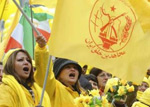 EurActiv: Iran’s rulers have every reason to be anxious. Whether real change is achieved is dependent on world powers harnessing the opposition’s momentum and backing their calls for grassroots change. EurActiv.com
EurActiv: Iran’s rulers have every reason to be anxious. Whether real change is achieved is dependent on world powers harnessing the opposition’s momentum and backing their calls for grassroots change. EurActiv.com
By Ivan Sascha Sheehan
 “Crippling sanctions. A currency in free-fall. Domestic unrest. And a fiercely determined political opposition. Welcome to Tehran in October 2012.
“Crippling sanctions. A currency in free-fall. Domestic unrest. And a fiercely determined political opposition. Welcome to Tehran in October 2012.
The recent US decision to remove the People’s Mojahedin Organisation of Iran (PMOI/MeK) from the terror roster was the shot heard around the world. Following in the footsteps of Britain in 2008 and the EU in 2009, US Secretary of State Hillary Clinton issued a September surprise by announcing that she would strike the group’s terror tag late last month.
The de-listing corrects a 1997 mistake made by then President Bill Clinton and sets the stage for a bold new phase in US-Iran relations.
The announcement wasn’t the first time Secretary Clinton cleaned up a mess made by her husband. But it may be the most consequential.
Secretary Clinton’s reversal of the 15-year-old decision to appease the regime in Iran by sidelining their primary resistance is the clearest indication to date that the policy of unending diplomatic engagement with the Iranian regime is over.
The listing became a bipartisan failure as successive US presidents bowed to Iranian demands, each outdoing the other in an effort to capitulate and concede their way towards a more peaceful relationship.
The decades-long struggle to please Tehran through negotiations and open-ended discussions did not have the intended effect. Political engagement did not stem the tide of proxy violence nor did appeasement provide the impetus for Iran’s theocrats to join the civilised world.
Instead, the willingness to bargain over the opposition’s fate telegraphed weakness and denied the world access to a key ally in containing Iranian aggression.
With the mullah’s cages rattled by the unchaining of the main opposition to clerical rule, Iran’s rulers now have every reason to be anxious. Whether real change is achieved is dependent on world powers harnessing the opposition’s momentum and backing their calls for grassroots change.
Here’s what can be done to help Tehran realise their worst fears:
With the terror label lifted, PMOI/MeK must take immediate action to push back on the deceptive disinformation campaign waged against them for decades. The campaign is as dishonest as it is well funded and it’s fuelled directly from Tehran. Few academics that have studied the opposition or written about their goals objectively have not been alternately threatened or extended olive branches to keep their mouths shut. More must be done to bring the regime’s propaganda machine into full view.
With the opposition correctly recast as a political movement – their legitimacy buoyed by broad support from US and EU lawmakers, dignitaries of all stripes, and prominent academics – it’s now time for the world to be reintroduced to Iran’s primary expatriate dissident group, led by Maryam Rajavi, the president-elect of the opposition’s Paris-based de-facto parliament in exile. The group’s determined campaign for democracy, human rights and freedom must now take centre stage and the opposition’s message should be taken directly to world leaders.
Finally, all politics is local and no opposition organisation causes Iran’s clerical rulers more sleepless nights than PMOI/MeK. The Iranian problem has an Iranian solution and the world should reject the false dichotomy of foreign military intervention and unending political engagement. Academics have long known that regime change from within constitutes a third path and the most sensible means for promoting new and stable governance.
Iran’s vast petroleum exports have so far shielded the regime from outright collapse but enhanced sanctions are taking a toll and a financial crisis looms large.
The Iranian rial has lost more than half it’s value this year alone. With prices rising, inflation threatens social cohesion and discontent on the Iranian street is certain to continue its rise.
US and EU lawmakers can exacerbate these problems and further split the regime by strengthening sanctions and heightening existing tensions between President Mahmoud Ahmadinejad and supreme leader, Ayatollah Ali Khamenei.
The temptation to leverage Tehran’s pain to enact concessions on the nuclear issue will be great. But domestic unrest should instead be used to facilitate regime change from within. Free of the need to justify their efforts, the opposition can now train their sights squarely on Tehran.
The world would be wise to get out of the way.
Ivan Sascha Sheehan is director of the Negotiation and Conflict Management graduate programme in the School of Public and International Affairs at the University of Baltimore (USA).


